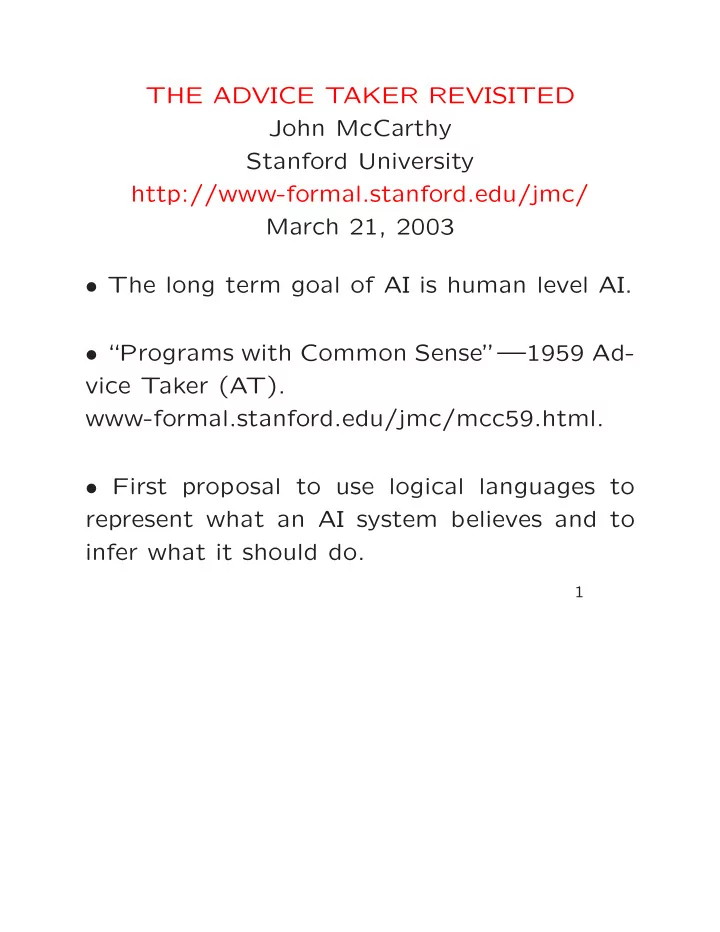

THE ADVICE TAKER REVISITED John McCarthy Stanford University http://www-formal.stanford.edu/jmc/ March 21, 2003 • The long term goal of AI is human level AI. • “Programs with Common Sense”—1959 Ad- vice Taker (AT). www-formal.stanford.edu/jmc/mcc59.html. • First proposal to use logical languages to represent what an AI system believes and to infer what it should do. 1
• Representation of facts independent of pur- pose. When objects collide there’s a noise. make noise, avoid noise, explain no noise, de- sign quiet car.
PROPOSALS FROM AT THAT ARE USED • Use logic to represent information declara- tively. • [Common Sense Informatic Situation] In gen- eral a thinking human is in what we call the common sense informatic situation , as distinct from the bounded informatic situation . The known facts are necessarily incomplete. We live in a world of middle-sized object which can only be partly observed and in which the con- sequences of our actions can only partly be determined. • Represent effects of actions. 2
• Prove logically that a sequence a of actions achieves goal g . • System does action a when should ( a ) is in- ferred.
IDEAS FROM AT THAT ARE NOT MUCH USED • Complex expresssions as objects— Want ( At ( I, Airport Want ( At ( I, x )). • Formal generalization • Domain dependent logical inference heuris- tics. • Declarative expression of domain dependent inference heuristics. J. Sierra does it. S. Makar- ios is doing it. 3
DEVELOPMENTS IN LOGICAL AI • Frame, qualification and ramification prob- lems. • Elaboration tolerance • Non-monotonic reasoning, default reasoning • Fast propositional satisfiabilty solvers • Probability based problem formulations and solvers. • I think the problems encountered and partly solved in logical AI will appear in any approach aiming at human level. 4
ADVICE ON ADVISABLE SYSTEMS • Use at least full first order logic. • Do not only use unary predicates. What’s a convertible? • Advisable behavior requires nonmonotonic rea- soning. • Include heuristic advice. • Don’t make an English interface a major part of the project. For every boy there’s a girl who loves only him. • Do not emphasize beginners. 5
MORE ADVICE ON ADVISABILITY • elaboration tolerance —www-formal.stanford.edu/jm There’s an oar on each bank, but the boat needs two oars to carry two people. • Use Drosophilas for research and select them carefully, so that the experiments will be max- imally informative. • Remark: The geneticists have used Drosophi- las since 1910, but the Drosophilas of today are no better than those of 1910. 6
A POSSIBLE DROSOPHILA • Building and moving towers of different kinds of blocks. • Advice: green blocks don’t fit on red blocks, towers 5 high fall down, decide what blocks are to be in a tower before considering mov- ing any blocks. As long as there are moves to final position, keep doing them. Do not put a block on another unless it is a move to final position. A block is in final position if it is on the block it is supposed to be in the goal (or on the table if that is its position in the goal), and the block it is on top of is in final posi- tion. Postpone postponable goals. STRIPS as 7
advice in situation calculus. Never play cards with a man named Doc; never eat at a place called Mom’s; never marry a woman with more troubles than you. • From George Polya’s How to solve it — • If you suddenly find yourself in danger, think what you just did and take it back. • Some kinds of advisability depend on self- awareness. Avoid wishful thinking.
NOW’S THE TIME, BUT IT WON’T BE EASY. • Start with an easy problem. • • • • • 8
Recommend
More recommend